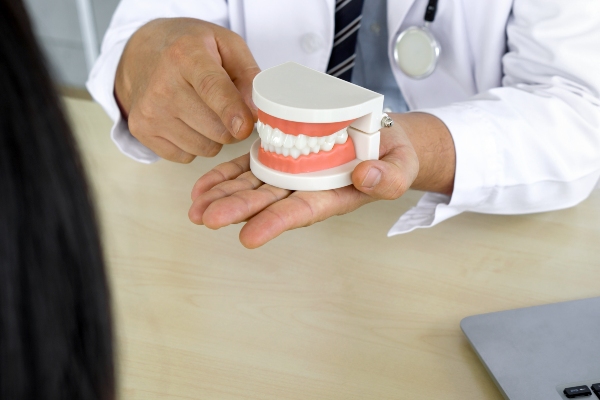Seeing a Complete Health Dentist for TMJ Sun Prairie, WI
Patients looking for TMJ treatment should consider complete health dentistry, as it focuses on how the patient’s overall health may affect and be affected by their condition. At best, TMJ is an annoyance. At worst, it is excruciatingly inescapable. A TMJ dentist knows how to address the root cause of this condition rather than just temporarily alleviating its symptoms.
Primary care dental is available at 608 Family Dental in Sun Prairie and the surrounding area. A complete health dentist can help reduce your TMJ woes while improving your overall health. Call us today at (608) 713-9418 to schedule an appointment or to learn more about our services.
Why Complete Health Dentistry
Complete health dentists take a more comprehensive approach to dentistry. Instead of treating a patient’s isolated symptoms, they consider all aspects of their health and how they may affect each other. As such, complete health dentists dedicate themselves to find the root cause of their patient’s conditions. This allows them to treat their overall health through their oral health. It also makes it possible to identify signs of other, broader health conditions.
This is especially important when dealing with TMJ since it is linked with so many other systemic conditions. Studies have shown that TMJ patients are more sensitive to pain. They also present body pain areas more frequently than their counterparts. Experts hypothesize that this implies a generalized dysfunction of the patient’s nociceptive system, the sensory nervous system’s way of encoding harmful stimuli. Thus, those with TMJ may have high rates of other painful conditions and systemic diseases occuring at the same time.
“…those with TMJ may have high comorbidity rates of other painful conditions and systemic diseases.”
Understanding TMJ
Temporomandibular joint disorders (also known as TMJ, TMJ disorders, TMJD, or TMD) occur when an individual’s temporomandibular joint sustains damage or is otherwise malfunctions. Ideally, this joint should function like a sliding hinge that connects the jawbone to the skull. There is one temporomandibular joint on each side of the jaw. Individuals affected by TMJ experience pain in the jaw joint and the muscles controlling jaw movement.
It can be challenging to determine the exact cause of a patient’s TMJ disorder, especially since there may be several different factors at play. These include but are not limited to arthritis, genetics, and jaw injury. Those with jaw pain are also likely to have bruxism, a condition in which one clenches or grinds their teeth. However, not everyone with bruxism has TMJ (or vice versa).
“Individuals affected by TMJ experience pain in the jaw joint and the muscles controlling jaw movement.”
Recognizing the Signs of TMJ
TMJ disorders can cause severe pain and discomfort, which may either be temporary or last years. This may affect either one or both sides of the face. It affects women more commonly than men, and it shows up most frequently in patients between the ages of 20 and 40. Common symptoms of TMJ include:
- A bite that suddenly feels uncomfortable
- Feeling “tired” in the face
- Jaws getting “stuck” or “locked” in the open- or closed-mouth position
- Pain or tenderness in or around the ear when chewing, speaking, or opening the mouth wide
- Pain or tenderness in the face, jaw joint area, neck, and shoulders
- Problems opening the mouth wide
- Swelling on the side of the face
- Trouble chewing
Many of these symptoms overlap with other conditions, making proper diagnosis critical. A complete health dentist will conduct a physical exam and ask the patient about their health history to rule out (or identify) any other health issues the patient may have. They will also check the jaw, bite, and facial muscles for functionality. Full-face X-rays, MRIs, or CT scans may also be necessary, depending on the severity of the patient’s condition.
“A complete health dentist will conduct a physical exam and ask the patient about their health history to rule out (or identify) any other health issues the patient may have.”
Check out what others are saying about our dental services on Yelp: Seeing a Complete Health Dentist for TMJ in Sun Prairie, WI
TMJ and Complete Health
TMJ is associated with several other health issues, including but not limited to, orofacial manifestations, scoliosis, and periodontal disease. Orofacial manifestations of TMJ include painful chewing, maximal mouth opening, and TMJ morning stiffness. At least one study has also shown that scoliosis could contribute to the restricted range of motion associated with TMJ disorders by causing a muscular imbalance. Additionally, any unilateral chewing associated with chronic periodontitis may also cause structural changes in the temporomandibular joint and worsen any secondary symptoms. Thus, treating any of these conditions has the potential to treat all others.
As complete health dentists are dedicated to a patient’s total wellness, they are well-aware of such issues and can identify and treat them accordingly. No condition exists in isolation; instead, they are all inextricably linked. With patients’ permission, complete health dentists can forward any relevant information to all pertinent healthcare providers to devise a comprehensive, custom-made treatment plan tailor-made to best meet their needs and improve their overall health.
“TMJ is associated with several other health issues, including but not limited to orofacial manifestations, scoliosis, and periodontal disease.”
Treating TMJ
TMJ symptoms sometimes go away without treatment. However, if symptoms persist, patients may need to seek medical treatment. A complete health dentist can identify the symptoms’ root cause and devise a customized treatment plan tailor-made for the patient’s unique and individual needs. If over-the-counter pain medication does not relieve a patient’s discomfort, a dentist may prescribe more potent pain relievers and anti-inflammatories on an as-needed basis.
Oral appliances, such as splints or mouth guards, may also help, as those with jaw pain often benefit from wearing a soft or firm device over their teeth. Certain jaw exercises may assist in stretching and strengthening the jaw muscles. Physical therapy for jaw pain may include ultrasound, moist heat, and ice. Surgery may be necessary if these treatments are insufficient. Such procedures include arthrocentesis, TMJ arthroscopy, modified condylotomy, and open-joint surgery. Some patients also benefit from corticosteroid injections.
Frequently Asked Questions
Q. Is there anything I can do to alleviate my TMJ symptoms at home?
A. TMJ flare-ups are common and typically resolve themselves within a few weeks. Still, this does not lessen the importance of treatment — especially if your symptoms cause discomfort. Encouraging the jaw joint to relax can assist in healing. You can do this by applying moist heat or ice to the affected area, resting the jaw by avoiding unnecessary use, supporting the jaw when , and reducing stress levels. Over-the-counter anti-inflammatories can also help. Reduce your stress levels if possible, and consider jaw exercises.
Q. What are some jaw exercises that can help relieve my TMJ pain?
A. One exercise you can try is to push down on the bottom teeth with one hand while pushing upwards with your jaw. You may also want to try placing your thumb below the chin, putting light pressure on the chin bone. Open your mouth slowly, working against the resistance.
Q. Is TMJ causing my headaches and migraines?
A. It is possible. Many people experience headaches and migraines due to TMJ pain, which may also radiate to the shoulders. It typically begins near the ears, forehead, or scalp. As such, TMJ headaches are commonly mistaken for tension headaches.
Q. What is splint therapy for TMJ?
A. In splint therapy, a splint (also known as a mouth or bite guard) is placed over the teeth to prevent the patient from grinding their teeth, clenching their jaw, or doing any other movement that could aggravate their TMJ. Splints are custom-made for each patient’s individual needs, meaning they may be either soft or hard. Splints relax the muscles in the mouth and support the bite.
Q. How long will I need to wear my splint?
A. As every patient is different, the answer to this varies on a case-by-case basis. Typically, however, patients should not wear a splint for more than six months at a time, as overusing a splint can cause further issues. 608 Family Dental can discuss this further with you while devising your individualized treatment plan.
Quality Dental Services Can Transform Your Smile
By visiting us as soon as possible, our team can help get you the professional treatment you need. Instead of waiting around and allowing the symptoms to get worse, we can provide you with treatment options.
Dental Terminology
Call Us Today
When choosing a primary dental care provider, you want to make sure that they can cover all the bases — including treating your TMJ. Our complete health dentist at 608 Family Dental may be able to help. Call us today at 608-713-9418 to schedule an appointment or to learn more about our services.
Helpful Related Links
- American Dental Association (ADA). Glossary of Dental Clinical Terms. 2021
About our business, license, and website security
- 608 Family Dental was established in 1995.
- We accept the following payment methods: Cash, Check, Discover, MasterCard, and Visa
- We serve patients from the following counties: Dane County
- We serve patients from the following cities: Sun Prairie, Madison, DeForest, Marshall, Windsor and Cottage Grove
- WI (License #1001349-15). View License Information and Specifics
- National Provider Identifier Database (1699228411). View NPI Registry Information
- Norton Safe Web. View Details
- Trend Micro Site Safety Center. View Details







